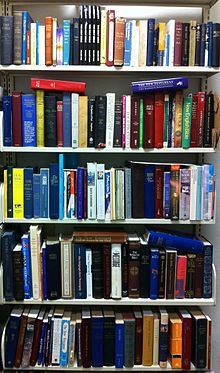When a Latin translation changed one word from the book of Jonah in the fourth century, a riot broke out in the church of Africa. Augustine outlawed the use of that Bible in his congregation. Modern Bibles change a lot more. Does it matter which Bible you choose?

At first glance it seems to make little difference. We read the Gospel in all Bibles, from (Revised) King James Version to Great News / NIV. Converted it involves one different word per hundred words in the New Testament; 99 percent is just the same in all translations. The main issues of the Christian faith can be found in almost all translations. So if you want to practically move forward as a Christian, it seems obvious to choose a well-readable, modern Bible. Also as a denomination. After all, don’t we want to be a church that is relevant to this day and age?
Indeed, the Gospel must take root in our lives and in that of Christians in general. While I affirm this, there is a lot more to be said about this topic. Not even touching on obvious secular angles like religion and business. Bibles are a huge industry. It would be narrow-minded to consider the issue of Bible translation and use only from the angle of cultural conformity. It could even be argued to be spiritual harmful as a standard. In this contribution, I deliberately limit myself to the text of the New Testament and do not go into modern linguistic considerations.
From God
The Church has always believed that all Scripture comes from God. According to Reformed Catholic teaching, the Bible does not contain inspiring stories of religious people, but God speaks through human minds. The Early Church spoke of “sacred letters and syllables”.
The textual tradition of Scripture is part of the faith community of the church. Inspired editing and growth of the Bible text is part of this. Theologians know that for as long as the church exists. We see it in the place names of Genesis, in the Psalms and at the end of Deuteronomy. For the Early Church the original version (“autografon”) of Moses or David was irrelevant. Nobody thought of deleting verses because they did not “originally” belong to it.
Yet that is the philosophy behind most modern Bibles. Tradition is full of mistakes, they say, and we must try to reconstruct the original text of Scripture. Only since a mere hundred years have we thought that this is desirable and possible. Or can be approached.
Doubtful approach
But it is quite possible that what is now the accepted way of thinking – and a theologian who wants to make a career may not deviate from it – will be typified as a fallacy by subsequent generations of scholars. A fallacy that did not do justice to the nature of religious texts.
The foundation for modern Bible translations was compiled and established in the last century by a committee of the United Bible Societies. By choosing phrase for phrase from thousands of manuscripts, a reconstruction of the original text was intended. Technically, however, this “UBS-version” (Nestle-Aland in scientific editions) became a new text. It is a reconstruction by scholars, for which as such primary sources are missing. Accepting this text, which most theologians today do and faithfully repeat to students who in their turn tell congregations, is therefore a matter of faith in the deliberations of the committee and in the religious desirability of such a reconstruction.
Is it problematic to adopt what should be referred to as the Reconstructed Text? No and yes. In the ecclesiastical tradition, comparison and correction have always taken place when writing manuscripts. The new text is not only about linguistic nuance, but also substantial substantive differences. From a liturgical and spiritual perspective this has major implications. The ecclesiastical text that has been used demonstrably in the churches of East and West throughout the world for some 1,500 years has been set aside.
Continuity of that age-old ecclesiastical text can now only be claimed by those Protestants who are using the (Revised) King James Version, most Orthodox Churches who use a similar text and to some Roman Catholic communities, for instance those Latin Mass communities who are hanging on to the Clementine Vulgate.
Recently I wrote about this in the journal Neotestamentica (https://muse.jhu.edu/issue/39817), which is at this stage unfortunately not available as open access. My contribution lists more than twenty verses that have disappeared from modern Bibles, including the Vatican’s New Vulgate, but are included in the King James Version and Jerome’s Vulgate.
Checking whether I am right is a fun project for the religious lesson or the catechism. Especially for you as reader of this blog, I have made the final draft available so that you can be privy to the results and data, and make up your own mind. Far too many professional theologians have tried to do that for you. I won’t. Just consider the facts. I am of the old fashioned school of liberal enquiry and trusting in the veracity of the biblical saying which predates modern cognitive therapy: that it is ultimately the truth that will set you free.
Important?
How important is this? What Bible we read shows what we believe about God’s speaking in our lives. It also determines our experience of the communion of saints, the church of all times and places. Does God speak infallibly and does He watch over His Word? The Early Church answered affirmatively. Do you?
Original article in Reformed Daily: Maakt het uit welke Bijbel u gebruikt?
